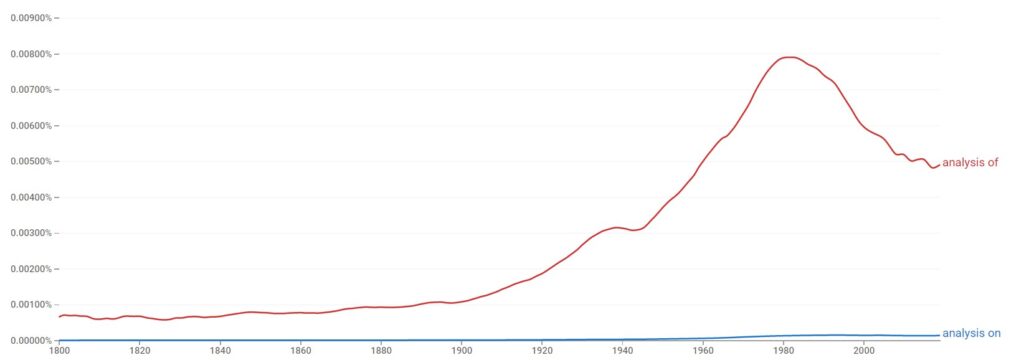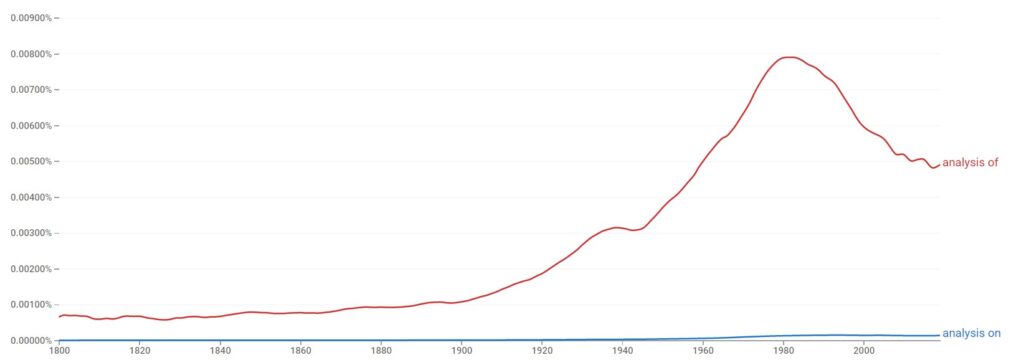We must make sure to always use the correct preposition after words like “analysis” in English. In this article, we’ll look at the differences between using “analysis on” and “analysis of” to see whether one is correct or if it’s more popular than the other.
Is It “Analysis On” Or “Analysis Of”?
“Analysis of” is the correct preposition to use. We use “analysis of” to talk about the subject of something that we’ve studied or examined in great detail. “Analysis on” should only be used if you’re talking about the specific medium you did the analysis on.

According to The Cambridge Dictionary, the definition of “analyze” is “to study or examine something in detail, in order to discover more about it.”
Typically, the situations where “analysis on” is correct are very limited. It’s rare to come across a context where it works, so we mostly just focus on “analysis of.”
Is “Analysis On” Or “Analysis Of” Used The Most?
We can actually go one step further and show you the statistics associated with using the phrase.
From this graph, it’s clear that “analysis of” is the most popular choice. It’s much more common to use this in English than any version of “analysis on.” As you can see, “analysis on” barely comes off the line compared to “analysis of.”

According to Google, “analysis on” is mentioned 4,020 times on The New York Times website, while “analysis of” is mentioned 76,500 times.
That shows you just how different the two phrases are. While neither of them is considered to be incorrect, there’s definitely a clear favorite when it comes to using them in writing.
Is It Ever Correct To Use “Analysis On”?
So, when do we use “analysis on” in the correct sense?
“Analysis on” should be used when you’re talking about the specific instrument you used to carry out an analysis. It could refer to software or a document that you used to carry out the investigation.
If you’re not talking about the software being used, then you’ll use “analysis of” to talk about the subject that was being analyzed. There are no other explanations for using “analysis on.”
The only other time it might appear in English is when people make the mistake of using it accidentally to talk about the subject they analyzed, instead of using the correct version “analysis of.”
Examples Of How To Use “Analysis Of” Or “Analysis On”
We want to show you some examples of using both of the phrases to help you understand when they’re correct. Since they both work to some degree, we’ll separate them for you to help you work your way through them.
Analysis Of
The most popular phrase of the two and the one that is used most correctly is “analysis of.” We use the preposition “of” in this case to talk about the thing that we’re analyzing.
- I performed an analysis of the software.
- He instructed me to create an analysis of the information they provided.
- She helped in making the analysis of the data.
- We performed an analysis of the most common instruments found in bands.
Analysis On
Now let’s see the very limited chances where “analysis on” is correct. We can only write it when we’re talking about what we used to do the analyzing for us.
- I completed this analysis on database software.
- We completed the analysis on this software.
Which Other Prepositions Can Be Used With “Analysis”?
There are a couple of other prepositions that you might come across when using “analysis.” We’ll avoid using “on” or “of” again since we’ve already mentioned them in the article.
Analysis Through
“Analysis through” talks about using something else as a platform to create an analysis of something. It’s similar to “analysis on” but uses a more specific medium.
- We should talk about the analysis through Skype.
Analysis With
“Analysis with” is used when talking about analyzing two or more things alongside each other. We can also use it when we want to do an analysis with another person.
- I shall complete this analysis with you.
Analysis By
“Analysis by” works best when we’re talking about a deadline that the “analysis” is required by.
- I’m going to need that analysis by Friday.

Martin holds a Master’s degree in Finance and International Business. He has six years of experience in professional communication with clients, executives, and colleagues. Furthermore, he has teaching experience from Aarhus University. Martin has been featured as an expert in communication and teaching on Forbes and Shopify. Read more about Martin here.
